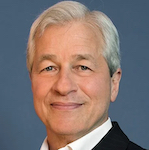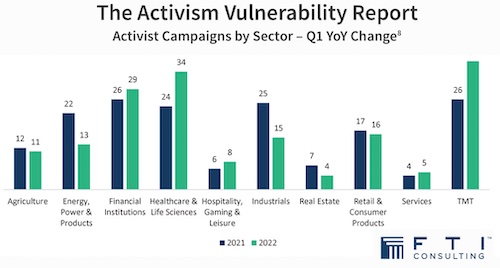 |
| Jamie Dimon |
“Who the hell knows?” said JPMorgan Chase chief Jamie Dimon, the favorite economic forecaster of the media and Wall Street.
He made that incredibly honest remark after entertaining analysts at a June 1 financial conference by delivering a meteorological forecast.
Dimon warned about the need to brace for an “economic” hurricane.
He then went on to downgrade that hurricane, saying it could turn out to be a minor one or a superstorm Sandy.
Dimon further muddled the forecast, noting some “bright clouds” over the US in terms of plentiful jobs, rising wages and a robust banking sector.
His presentation had many in the audience scratching their heads.
Dimon’s talk comes as the world’s economy faces unprecedented challenges from rising energy prices, raging inflation, potential food shortages, US midterm elections and war in Ukraine that could result in a nuclear disaster.
The JPMorganChase chief could have saved time and energy by limiting his talk to: “Who the hell knows?”
That single remark would have generated huge headlines throughout the world and neatly summed up the very uncertain global economic condition.
Dimon made the correct career choice by choosing banking over becoming a TV weatherman.
 |
Corporate activists take a breath. There was a slight uptick to 172 activist campaigns launched against US companies during the first-quarter, according to FTI’s activism vulnerability report. There were 169 campaigns launched during the 2021 period.
Technology, media and telecom ranked as the most targeted category, followed by healthcare/life sciences and financial services.
FTI found that activists gained only 39 board seats during the quarter, which was the fewest number for the last four years.
Despite the muted activism activity, rising interest rates and continued volatility in the stock market will provide some opportunities for activists to make a run at underperforming companies.
But who knows how things are going to turn out? Right, Jamie?
Stop scapegoating the mentally ill for your unwillingness to deal with the nation’s mass shooting plague.
That’s the message of the American Psychiatric Association to Republican lawmakers.
It notes that the overwhelming majority of people with mental illness are not violent and are more likely to be victims of violent crime than perpetrators.
Rhetoric that blames mental health for mass shootings “will further stigmatize and interfere with people accessing needed treatment without addressing the root causes of firearm violence,” said the APA.
Texas Governor Greg Abbott is scapegoating the mentally ill. He ruled out any gun restrictions in the aftermath of the murder of 19 students and two adults at Robb Elementary School.
His public comments about ending the mass shooting epidemic focus on mental healthcare and school security.
On June 1, Abbott asked the Texas legislature to create committees to deal with mass shootings.
They are to focus on firearms safety, school safety, mental health, social media and police training.
Abbott is not one of those “rational Republicans” that president Biden is trying to find for a gun control deal.


 Publicis Groupe CEO Arthur Sadoun puts competition on notice... Macy's throws in the towel as it appoints two directors nominated by its unwanted suitor... The Profile in Wimpery Award goes to the Ford Presidential Foundation for stiffing American hero and former Wyoming Congresswoman Liz Cheney.
Publicis Groupe CEO Arthur Sadoun puts competition on notice... Macy's throws in the towel as it appoints two directors nominated by its unwanted suitor... The Profile in Wimpery Award goes to the Ford Presidential Foundation for stiffing American hero and former Wyoming Congresswoman Liz Cheney. JPMorgan Chase chief Jamie Dimon's "letter to shareholders" is a must-read for PR people and others interested in fixing America and living up to its potential... Get ready for the PPE shortage when the next pandemic hits... Nixing Netanyahu. Gaza carnage turns US opinion against Israel's prime minister.
JPMorgan Chase chief Jamie Dimon's "letter to shareholders" is a must-read for PR people and others interested in fixing America and living up to its potential... Get ready for the PPE shortage when the next pandemic hits... Nixing Netanyahu. Gaza carnage turns US opinion against Israel's prime minister. Trump Media & Technology Group sees Elon Musk's X as an option for those who want the free expression promised by Truth Social but without Donald Trump, owner of 57.3 percent of TMTG... Chalk one up for "anti-woke warrior" governor Greg Abbott as University of Texas lays off 60 DEI-related staffers... Five percent of Americans see the US as its own worst enemy, according to Gallup.
Trump Media & Technology Group sees Elon Musk's X as an option for those who want the free expression promised by Truth Social but without Donald Trump, owner of 57.3 percent of TMTG... Chalk one up for "anti-woke warrior" governor Greg Abbott as University of Texas lays off 60 DEI-related staffers... Five percent of Americans see the US as its own worst enemy, according to Gallup. Nine of the Top 100 firms that participated in O'Dwyer's rankings last year apparently threw in the towel for the 2024 scorecard. Seven other firms also went AWOL.
Nine of the Top 100 firms that participated in O'Dwyer's rankings last year apparently threw in the towel for the 2024 scorecard. Seven other firms also went AWOL. The silence of the White House enables Israel's crackdown on foreign media as it objects to coverage of the carnage in Gaza... Israel plans yet another probe. Promises investigation of its "unintentional" attack on workers delivering food to famine-sticken Gaza... Trump White House media star Hope Hicks to return to spotlight.
The silence of the White House enables Israel's crackdown on foreign media as it objects to coverage of the carnage in Gaza... Israel plans yet another probe. Promises investigation of its "unintentional" attack on workers delivering food to famine-sticken Gaza... Trump White House media star Hope Hicks to return to spotlight.


 Have a comment? Send it to
Have a comment? Send it to 
Jun. 3, 2022, by Joe Honick
I only today read the Dimon Tevye-like economy comment. Few people have played more games with investors than this gentleman, except perhaps the new entry Mr. Musk, money gathererer supreme and market manipulator unrivaled. One additional problem is how millions hear their "fluid" comments from alleged and breathless newscasters who churn the prediction of Dimon and Musk as if something has actually occurred necessitating rapid runs for either the hills or local tunnels. If more stringent rules are required to harness the lies of press releases, Dimon and Musk should be relicensed as entertainers or standup comics.